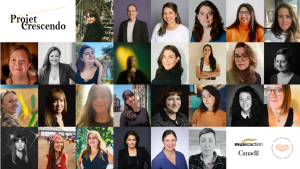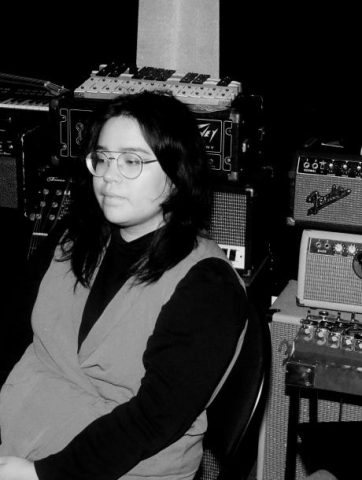To mark the publication of Musicaction’s annual report, Paroles & Musique took a look at the over-arching orientation of an organization that, since 1985, has been devoted to the development and promotion of Canada’s Francophone music. To better understand how Musicaction is adapting to the economic and social changes that are affecting society as a whole and their impact on the music business, we met with General Manager, Louise Chenail.

Louise Chenail of Musicaction
From the get-go, Chenail describes herself as an octopus, able to juggle with several ideas at once. This intellectual agility comes as no surprise, from a woman who’s worked for Musicaction since 1997, in various roles, before heading it (since 2011). If she generally keeps a low profile in the media, it’s not out of modesty, but rather out of respect for the work of a team whose passion and skills she never hesitates to praise.
“There’s a reason why we decided to present our org chart as a circle,” says Chenail. “Imagine it’s like a solar system where the recipient is at the centre, surrounded by front-line people, the analysts, who carry out the brunt of the work. Administrative people like myself are there to support them, but now more than ever, our goal is to have boots on the ground to directly address the needs of those recipients. I’m obsessed with making our programs accessible to as many people as possible, and I want us to deploy strategies that directly serve the creative process.”
After a couple of turbulent years during which it was called upon to distribute emergency and recovery funds in the exceptional context of the pandemic, Musicaction intends to continue the modernization drive that it began in 2020. It was a necessary step, especially since falling revenues have forced the organization to cut 10 percent of its program commitments for the year 2023.
Musicaction is still able to fulfill its primary mandate of supporting artists, and the music industry, while continuing to contribute to society as a whole. In the opening remarks of the recent annual report, the organization’s Chairman of the Board, Pierre Rodrigue, describes it as a “driver of change,” capable of taking part in major social movements. Ambitious? On the contrary, Louise Chenail firmly believes that by embracing this committed approach, Musicaction can better serve creators.
An good example of this kind of commitment is the parental support measures introduced a few years ago. Initially designed for female artists, the program was extended to fathers, and then to all professionals in the field, whether musicians or corporate employees.
“Our desire to provide the best possible representation for all our users has led us to ponder such major issues. That’s what led us to gender parity on our juries, for example,” says Chenail. This isn’t just window-dressing to make the organization look good, but rather, the culmination of in-depth reflection, informed by the realities of the business. “That’s why we got involved in the report on women in the French-Canadian music industry, led by Joëlle Bissonette,” adds the executive. “It was an important step for us, because not only did it highlight specific hurdles faced by women, the report also proposed possible solutions.”
 Obviously, without concrete action, such noble intentions would simply drown in rhetoric. That’s why Chenail enthusiastically mentions the Crescendo project that supports women entrepreneurs, by pairing them up with established mentors in the music industry. It was based on ideas tested by Musicaction in a program designed for Indigenous communities – one that had excellent results.
Obviously, without concrete action, such noble intentions would simply drown in rhetoric. That’s why Chenail enthusiastically mentions the Crescendo project that supports women entrepreneurs, by pairing them up with established mentors in the music industry. It was based on ideas tested by Musicaction in a program designed for Indigenous communities – one that had excellent results.
“One of the most beautiful examples is Makusham,” says Chenail. “Initially, it was a studio, but now it’s the most important record label established in an Indigenous community. It’s positive for those communities, but it’s beneficial for the whole industry, because it’s enriched by a better dissemination of the work of these creators.”
Fully conscious, it would be futile to blindly sprinkle dollars left and right. Chenail constantly stresses the importance of being on the ground to take into account the real needs of the community. “It goes beyond simple support: it’s a real dialogue between us and the recipients,” she explains. “Before we did anything, we talked with the people in those communities, and evaluated what their needs were. After that, our staff and program mentors received training in Indigenous entrepreneurship, to help us tailor our interventions.”

Kanen
Among the artists who’ve benefitted from this commitment and support is Kanen, whose star has been on the rise over 2023, notably by being named the Révélation Radio-Canada, among other accolades. The Innu artist, originally from the community of Uashat mak Mani-Utenam, is a perfect example of Musicaction’s multi-faceted approach. Not only has she benefited from individual support as an artist, but her label, Musique Nomade, is also supported by the organization through collective programs.
“We’re proud of what we’ve accomplished, but these are just the first steps,” says Chenail. “We’re aware of the specifics of our various clienteles, and if we want to continue to move forward and do more, we need to listen to them and learn from their experiences.”
Beyond its support for the creation of new music, Musicaction also contributes to the development of an ecosystem that fosters the emergence of new talent. After all, versatility is in its DNA, since its founders – broadcasters, ADISQ, and SPACQ – all represent different segments of the music industry, from creators to entrepreneurs.
“The diversity of our clientele is fundamental to us,” says Chenail. “We support emerging artists, but also emerging entrepreneurs. Obviously, artists are at the heart of what we do, and I’m extremely proud of the direct support provided to songwriters (almost $900,000 over the past year), because it’s a recognition of the raw material of our industry.”
This is good news for artists, who, in an all-too-often uncertain economic climate, will continue to benefit from the financial support of an organization that sees itself as a partner rather than an ATM. “We’re constantly surveying our clientele and adapting our practices to remain as relevant as we need to be,” says Chenail. “Modernization isn’t something we work on sporadically: it’s an ongoing process.”